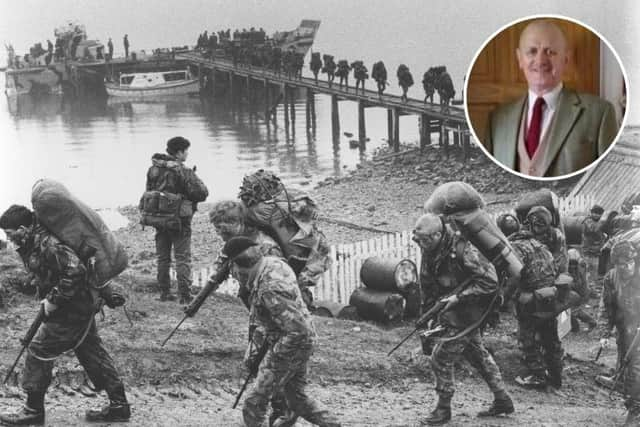Falklands War was ‘a job which had to be done’ says Penwortham veteran
and live on Freeview channel 276
The former Regimental Sergeant Major with the Scots Guards fought in the Battle for Mount Tumbledown and saw two comrades killed just yards away in a fearsome firefight.
He still salutes the bravery of Drill Sergeant Danny Wight and Lance Corporal John Pashley who lost their lives as their reconnaissance team of around 30 men pulled off an audacious night-time raid on Argentinian positions.
Advertisement
Hide AdAdvertisement
Hide AdTumbledown was regarded as the hardest nut to crack in the fight to regain the Falkland Islands.


The 2nd Battalion Scots Guards, supported by members of 9 Parachute Squadron Royal Engineers, were given the task of conquering the mountain on June 13/14 1982 - the middle of a harsh winter in the South Atlantic.
Colin was a sergeant in the "recce" platoon sent to launch a diversionary attack on enemy positions on the right flank to deceive the Argentinians on the direction of the main assault.
It worked and the mountain was taken, although overall the British forces lost nine men and a further 43 wounded in that battle. In Colin's assault group, which had to negotiate a minefield going in and coming out, two died and six were injured.
Advertisement
Hide AdAdvertisement
Hide Ad"I didn't know John Pashley very well because he was Royal Engineers, but I'd known Danny White from our depot days," recalled Colin who, after 29 years as a regular soldier, now works part-time in the film industry and security. "They were brave men and none of us will ever forget them.
"We had to create a diversion so the Argentinians thought the main assault was going this way, when in fact it was going another way. I only found out later that it had worked because the Argentinians moved a company down to our point.
"The guys died when they opened up on us. They were killed instantly in the first fire. A couple of our guys also got shrapnel wounds from grenades.
"I ended up in charge after people got wounded. We had six injured in total, some of them as we tried to get back through an area that was mined.
Advertisement
Hide AdAdvertisement
Hide Ad"Losing anyone will have an effect on you. As a regiment you are together all the time, so you become mates."
Colin, whose regiment had travelled down to the Falklands on the luxury liner the QE2, admitted life was far from comfortable once the troops arrived in the Falklands.
"It was the middle of the winter, it was freezing and the rain was horizontal," he said.
Was Margaret Thatcher right to send in the troops to recapture the islands? "She was totally right," said Colin, who lives in Penwortham.
Advertisement
Hide AdAdvertisement
Hide Ad"The job had to be done. It sent a message to other countries that the British could put together a large force, travel 8,000 miles and win. No-one thought we could do that.
"Me and the rest of the guys don't hate the Argentinians, they were just troops doing their jobs like us. In fact I went down to the Falklands in 2018 and met some of them."
In the film industry Colin has worked mainly behind the camera, although he has featured in three films. In Love Actually he was Prime Minister Hugh Grant's bodyguard.